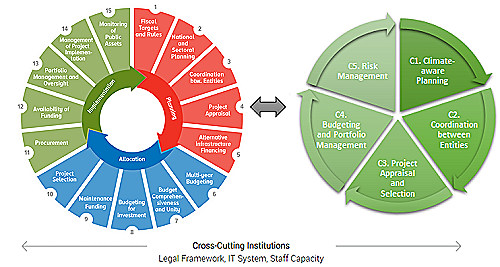Posted by Nicoletta Feruglio, Manal Fouad, and Suphachol Suphachalasai[1]
Massive infrastructure investment is needed globally to tackle climate change. Climate-responsive infrastructure will help to mitigate greenhouse gas (GHG) emissions and make economies more resilient to climate-related risks.
But the economic and social outcomes of public investment depend crucially on the efficiency of public investment management. Countries can waste up to one-third of the value of their public investment spending due to inefficiencies in the way they plan, allocate, and implement public investment projects.
To help countries improve the institutions and processes for infrastructure, the IMF developed in 2015 the Public Investment Management Assessment (PIMA) tool.
PIMA Framework | Climate PIMA |

To respond to the growing need for countries in investing in climate-responsive infrastructure, the IMF has recently added a Climate module to the PIMA framework (C-PIMA) to support countries in strengthening their public investment management systems to deliver their climate objectives. A has just been released and presents the C-PIMA framework and plans going forward, reflecting lessons from testing the module.
The C-PIMA is designed around five pillars of public investment management that are key for climate-aware infrastructure: planning, coordination across government, project appraisal and selection, budgeting and portfolio management, and risk management. The framework has been tested in eleven countries, providing early lessons on its efficacy and broad applicability. The relationship between the five pillars of C-PIMA and the 15 PIMA institutions is summarized in the two charts above.
A C-PIMA exercise assesses institutional readiness and gaps in infrastructure governance against the backdrop of climate change challenges in countries of all capacity levels. It formulates a set of tailored recommendations and a prioritized and sequenced action plan that will support the implementation of the most appropriate infrastructure projects for the country. It also can facilitate access to climate finance through helping countries improve their infrastructure governance. The findings of a C-PIMA are summarized in a concise report, which also discusses the linkages between climate change, public infrastructure and climate strategies in a country.
[1] Fiscal Affairs Department, IMF.
Note: The posts on the IMF PFM Blog should not be reported as representing the views of the IMF. The views expressed are those of the authors and do not necessarily represent those of the IMF or IMF policy.








